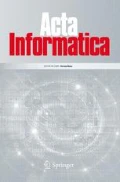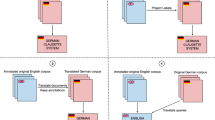Abstract
In this note, we show that the number of equivalence queries asked by an algorithm proposed in Becerra-Bonache et al. (Proceedings of the 8th International Colloquium on Grammatical Inference (ICGI ’06), Lecture Notes in Artificial Intelligence, Springer-Verlag, Berlin 2006) that learns deterministic finite automata with correction and equivalence queries is at most the injectivity degree of the target language, a notion that corresponds to the number of repetitions among the correcting words of all the elements in the quotient of that language by the Myhill-Nerode equivalence. Further, we propose a tight upper bound for the number of correction queries as a function which depends on the index of the target language, the length of the longest counterexample returned by the teacher and the injectivity degree of the target language. However, the bounds obtained here for the number of CQs are optimal for the LCA algorithm, and they do not represent a tight upper bound for DFA learning with EQs and CQs in general.
Similar content being viewed by others
References
Angluin D.: Learning regular sets from queries and counterexamples. Inf. Comput. 75(2), 87–106 (1987)
Becerra-Bonache L., Dediu A.H., Tîrnăucă C.: Learning DFA from correction and equivalence queries. In: Sakakibara, Y., Kobayashi, S., Sato, K., Nishino, T., Tomita, E. (eds) Proceedings of the 8th International Colloquium on Grammatical Inference (ICGI’06), Lecture Notes in Artificial Intelligence, vol. 4201, pp. 281–292. Springer-Verlag, Berlin, Heidelberg (2006)
Martín-Vide, C., Mitrana, V., Păun, G. (eds): Formal Languages and Applications. Studies in Fuzzyness and Soft Computing, vol. 148. Springer-Verlag, Heidelberg, Berlin (2004)
Myhill, J.: Finite automata and the representation of events. Technical Report. TR-57-624,WADD, Wright Patterson AFB, Ohio (1957)
Nerode, A.: Linear automaton transformations. In: Proceedings of the American Mathematical Society, vol. 9, 541–544 (1958)
Rivest R.L., Schapire R.E.: Inference of finite automata using homing sequences. Inf. Comput. 103(2), 299–347 (1993)
Tîrnăucă, C.: Language learning with correction queries. Ph.D. Thesis, University of Tarragona (2009). http://www.tdr.cesca.es/TESIS_URV/AVAILABLE/TDX-0302109-134530/Thesis.pdf
Author information
Authors and Affiliations
Corresponding author
Rights and permissions
About this article
Cite this article
Mitrana, V., Tîrnăucă, C. New bounds for the query complexity of an algorithm that learns DFAs with correction and equivalence queries. Acta Informatica 48, 43–50 (2011). https://doi.org/10.1007/s00236-010-0130-7
Received:
Accepted:
Published:
Issue Date:
DOI: https://doi.org/10.1007/s00236-010-0130-7




